Dans la forme affirmative, "have to" a le même sens que "must" et il est utilisé pour exprimer des obligations Cependant, "have to" est plus flexible que "must", car nous pouvons l'utiliser au passé, au présent et au futur C'est pour cette raison que "have to" HAVE TO est utilisé pour dire que quelqu'un est obligé de faire quelque chose car il y est obligé, par la loi, une règle ou qu'il n'a tout simplement pas le choix Have to n'exprime pas une opinion Il se traduit plutôt par 'il faut que' Pour faire simple, must est plus précis et fort que haveClipping is a handy way to collect important slides you want to go back to later Now customize the name of a clipboard to store your clips

Difference Between Must And Have To With Examples And Comparison Chart Key Differences
Have to et must difference
Have to et must difference-Be careful with the negative of Must and Have to There is a BIG difference in meaning between Mustn't and Don't have to Mustn't means something is prohibited or it is not allowed It is important that you do NOT do something Don't have to means there is NO obligation to do something You are not required to do something, especiallyComment différencier MUST, SHOULD ou HAVE TO?



Have To Vs Must The Crazy Teacher S Blog The Crazy Teacher S Blog
Hi everybody ,I have a question that has been in my mind for a long time I had a fight with my English teacher in the past for that question ,What are the differences between ''should'' , ''must '' and '' have to ''?I don't think that there is any differences between them especially with ''must'' and ''should'' so can any one help me to understand that rule or the difference between Have To vs Must There is a slight difference between have to and must though they both seem to convey the same meaning In fact, it can be said that must and have to are two different words that give different senses and not the same meaning Must is known as a modal verb in the English language while have to is a verb Have to is a variation Have To vs Must There is a slight difference between have to and must though they both seem to convey the same meaning In fact, it can be said that must and have to are two different words that give different senses and not the same meaning Must is known as a modal verb in the English language while have to is a verb Have to is a variation of the verb have If we look at the origins of the two verbs must and have to, must has
On the other hand, "must" is used to convey a stronger meaning than simply "have to", it's more forceful "You must be here by 100pm" In this sentence, the use of "must" gives more import to the need to be here by 100pm However, it can also be used to show that something is logically the result of something else There is a small difference between the meaning of "have to" and "must" and it is a different type of obligation "have to" expresses objective obligation and "must" expresses subjective obligation So, What's the difference?Have to / must difference If we talk about the differences of these modalverbs, then there will be a lot more points In addition to the basic, semantic, there is also the difference in the presence of temporary forms, as well as a different approach to the formation of different types of sentences It is based on the type of verbs One is strong and the other is weak Hence the difference
Have to / must difference If we talk about the differences between these modal verbs, there will be many more points In addition to the main, semantic, there is also a difference in the availability of temporary forms, as well as a different approach to the formation of different types of proposals Here the basis is the form of verbs One of them is strong, and the other is weak I am teaching 'have to' vs 'must' (British English usage) and, according to the book, the difference is as follows must it's necessary to do it (because the speaker says so) have to it's necessary to do it (because it's a rule or law) The students had no difficulty with these ideas and applied them appropriately, both orally and in the initial exercises MUST et HAVE TO peu de différences de sens Must et have to s'emploient tous les deux pour exprimer une obligation Mais il y a une nuance entre les 2, pas évidente à saisir Je vais vous l'expliquer simplement pour que vous puissiez utiliser les 2 expressions à bon escient Pour MUST, il s'agit d'une obligation subjective




Have To Vs Must Watch This Video To Finally Learn The Difference
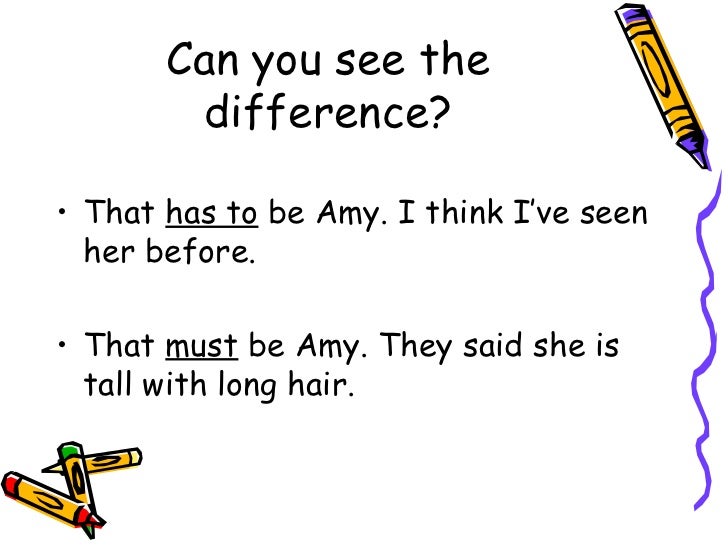



Have To Vs Must
Difference between Must and Have to – MUST 'Must' reflects the necessity of doing something, as per the given circumstances We use the word 'must' to show the indispensability of something It indicates the exigency of an act The word 'must' is used to express the compulsion or inevitability of doing something according to the circumstances, which cannot be ignored 'MustI have to file reports every week "Don't have to," "don't need to" and "mustn't" have very different 1 Must and Have To Must and have to are both used to talk about obligations things you cannot choose not to do For example We must talk to her before she leaves I have to go into work early tomorrow If you say, We must talk to her before she leaves, you mean that you think this is very important, and you need to do it When you say, I have to go into work early




Must English Grammar Gramatica Del Ingles Como Aprender Ingles Basico Gramatica Inglesa
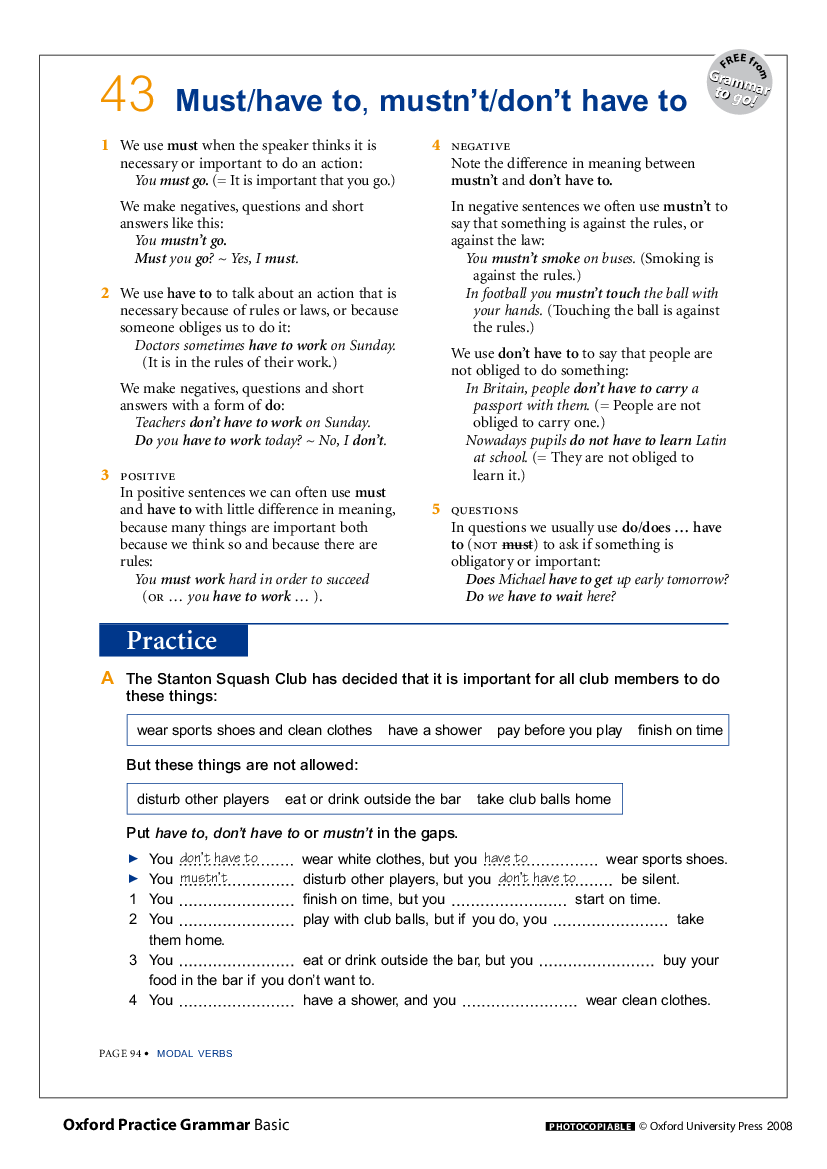



Must Have To Pobierz Pdf Z Docer Pl
You just clipped your first slide!Must, have toand have got toare all used to express obligationor theneed to do something They can be used interchangeably in the present tense, except that mustsuggests that it is the speaker Must is a modal auxiliary verb, and have to is a simple auxiliary that is used just like a modal verb, but it's not a modal verb The reason why we are learning it together is that both these verbs have similar functions In this article, I'll help you master all the differences between must and have to, and how to use these verbs There is a video lesson at the end that explains how to




Pdf Must Have To Emilia Butterfly Preschool Academia Edu




Unit 9 Grammar Modals Of Necessity 1 Have To And Must Ppt Download
Must et Have to ont des sens très similaires et quelquefois peuvent être utilisés indifféremment Cependant Have to implique une obligation externe, c'estàdire qu'elle vient de quelqu'un ou de quelque chose d'autre que celui qui parle Have to décrit ceMust or Have to Differences Both must and have to can be used to express the conclusion that something is certain Note that have to is more common in American English He must be mad to do this (OR He has to be mad to do this) You must be joking (You have got to be joking) Conclusions about the past are usually expressed with must followed by the perfect infinitive (haveEt comment les employer sans se tromper?



Have To Vs Must The Crazy Teacher S Blog The Crazy Teacher S Blog
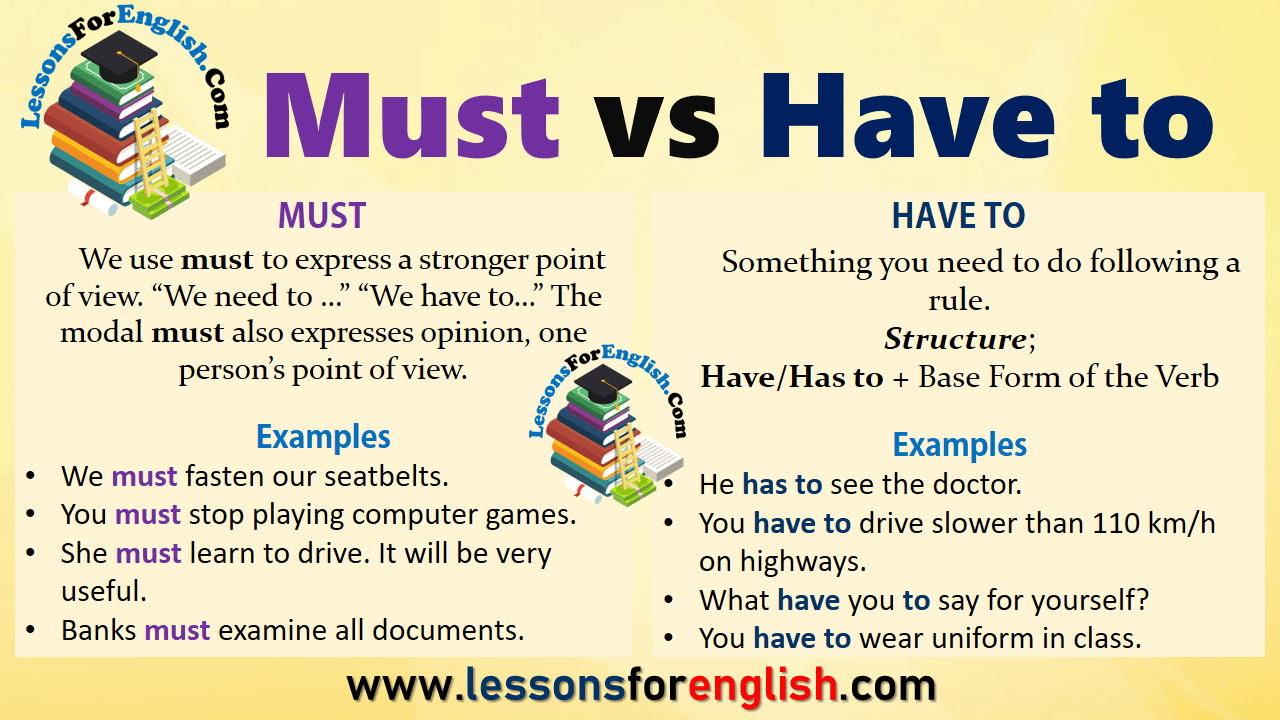



Must Vs Have To In English Vocabulary Home
In English, we use "must" and "have to" to express a strong rule or law In this grammar les In this grammar les Do we say "I must do my homework" or "I have to do my homework"? Have to et must sont des verbes qui donnent lieu à de nombreuses confusions Le premier signifie "avoir à" et le second "devoir" Les deux verbes servent à exprimer une obligation ou un devoir en français, on utilise un seul verbe "devoir" Dans l'article suivant, nous verrons dans quelles circonstances on utilise l'un ou l'autreSynonyme de have to Must is a higher degree (more intense) than Have to I have to go shopping means you are probably getting low on groceries I must



1




Have To Vs Need To Vs Must What S The Difference In English
We use have to / must / should infinitive to talk about obligation, things that are necessary to do, or to give advice about things that are a good idea to do Mus t and have to are both used for obligation and are often quite similar They are both followed by the infinitive I must go now / I have to go now "Have to' is more common, especially in North America, but in the UK there is a subtle difference 'must' is used for internal obligation and 'have to' is used for external obligationHave to, must Have to is NOT an auxiliary verb (it uses the verb have as a main verb) We include have to here for convenience Must is a modal auxiliary verb In this lesson we look at have to, must and must not, followed by a quiz to check your understanding have to for objective obligation We often use have to to say that something is obligatory, for example Children have




Which Vs That Is There A Difference Between Which And That




Which Vs That Is There A Difference Between Which And That
What is the difference between MUST and HAVE TO?When is it okay to use MUST and when to use HAVE TO?Our examples will help you lean to speak like a native sp "I must" is in the present tense and means you have to do something "I had to" is in the past tense and it is something you were obliged to do and had already done 'Have to' and 'must ' are both used to express obligation To use them correctly, you have to decide where the obligation comes fromI'm going to explain each of this in more detail Let's start with;




Must Vs Have To Easy English Conversation Practice Learn English Mark Kulek Esl Youtube




Difference Between Must And Have To With Table
Le livre GRAMMAR FOR MOVERS vous sera d'une grande aide Plus de livres de grammaire anglaise sur wwwgrammaireanglaisefr dans les livres de la collection le grammaire anglaise à la carteMust and have to modal verbs exercises Auxiliary verbs in English elementary, intermediate and adavanced level esl The main difference between must and have to, is that while must is a modal verb, have to is a semimodal verb, in the sense that as a modal verb it is used along with the verb to express necessity, but acts like a normal verb in its formulation
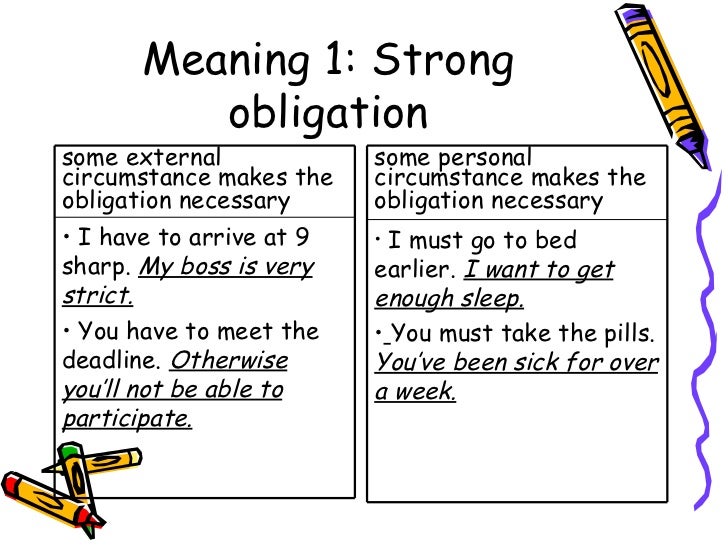



Have To Vs Must




The difference between MUST and SHOULD Must and Should are both modal verbs MUST is used when expressing obligation or an unavoidable requirement, whereas SHOULD is more of a recommendation, or simply a desirable goal MUST Similar to have to – strong obligation You must abide by the law You mustn't smoke indoors, it is illegal You must arrive on time;• Have to expressa, principalmente, obrigações comuns ou normais, enquanto must é usado para as obrigações específicas I have to brush my teeth twice a day Tenho que escovar os dentes duas vezes por dia I must tell you somethingHave to, must Quiz You can do this grammar quiz online or print it on paper It tests what you learned on the have to, must page 1 Yesterday I _____ finish my geography project must mustn't had to a) must b) mustn't c) had to 2 She will _____ wait in line like everyone else must have to has to a) must b) have to c) has to 3 All employees _____ on time for work must be mustn't have




Must Vs Have To Learn The Difference How To Use Modal Verbs In English Happy English Free English Lessons
/suspended-vs-revoked-license-f73910d7566b4a96bf58f103fad3c6a6.png)



What S The Difference Between A Suspended And A Revoked License
"Must" and "Have To" Differences For each space, choose which is better 'must' or 'have to' 1 Professor Watkins told me today that I give in that assignment by Friday at the latest 2 John! She must have been on holiday ☝️ Es común utilizarlo para recomendaciones o consejos Aquí es importante diferenciar entre 'must' y 'should' Should se usa para dar sugerencias You should go to the optician (Tienes la vista cansada, no ves muy bien de lejos) Must lo usamos cuando tenemos un deseo fuerte de que esa persona siga nuestra Discuss the differences between 'have to' and 'must' in the positive form Make sure to point out that 'have to' is used for daily routines while 'must' is used for strong personal obligation Discuss the differences between 'don't have to' and 'mustn't' Make sure to stress the idea that 'don't have to' expresses the idea that the person isn't required to do something but




Must Have To Should Ought To




The Difference Between Must Have To Shall Need And May
Must vs have to Both Must and have to express obligation or necessity, but there are some small differences • Must expresses the speaker's feelings, whereas have to expresses, above all, an impersonal idea You must come You are obliged to come (I require that you come) You have to come You are obliged to come Sometimes, "must" and "have to" can be used to speak about responsibilities However, "must" is generally used for strong personal obligations and "have to" is used for responsibilities at work and in everyday life I must do this right now!En effet, have to, signifie devoir Il veut dire être nécessaire, ou ne pas être nécessaire (have to/don't have to) Tandis que must, qui signifie aussi devoir, veut plutôt dire être important, ne pas être important (must/mustn't) Par exemple You must have good results at




Have To Vs Need To Vs Must What S The Difference In English




Must Vs Have To Must Not Vs Don T Have To 7esl Apprendre L Anglais Cours Anglais Anglais
But there are some small differences in connotation and how we use them (Connotation is the feeling or idea a word gives in addition to its meaning) And then, in negative sentences (for example, don't have to and mustn't), the meanings are not at all similar This means you must be careful about which verb you use"have to" form and structureHave to / must difference If we talk about the differences between these modalverbs, there will be many more points In addition to the main, semantic, there is also a difference in the availability of temporary forms, as well as a different approach to the formation of different types of proposals Here the basis is the form of verbs One of them is strong, and the other is weak




Difference Between Must And Have To With Examples And Comparison Chart Key Differences




Modal Verbs Should Must
Must vs Have To / Has To Exercise 1 Subject Explanations Modal Verbs Chart Could Should Would Verb3 Can / Can't Subject Exercises 1 Modals Exercises 2 Can vs Be Able To With Tenses 3 Can vs Could Exercise 4 Can Can't Exercises 567 Mustn't vs Don't Have to Exercises 1 / 2 / 3 10 Must vs Have to / Has to Exercises 1 / 2 / 3 11 Must / Mustn't / Needn't / Have to 1213 ModalsIntroduction On utilise les verbes de modalité "must have", "can't have" et "might have" pour faire des suppositions et des déductions sur une action passée qui s'est définitivement déroulée, qui ne s'est définitivement pas déroulée, ou qui s'est probablement déroulée, en se basant sur nos connaissances, renseignements ou preuves, ou l'absence de connaissances, renseignements ouThis is a one way street You turn back and use Smith Street 3 My back has been hurting for weeks I go to the doctor's 4 My company said that if I want this promotion, I go to the doctor's for a




English Teacher What Is The Difference Between Must And Have To In English Dz Breaking



Difference Between Have To And Must Difference Between
You must have been sleepy after work (仕事の後、あなたは眠たかったに違いない) まとめ 今回の記事ではhave to とmustの違いを紹介しました。 have toは 客観的な理由で~しなくてはいけない 、という意味で、mustは 主観的な理由で強制力の強い ニュアンスを含みます。Bien que les questions avec "must" soient grammaticalement correctes, "have to" est plus souvent utilisé de nos jours pour former des questions Il n'y a pas de forme passée pour "must" pour exprimer l'obligation We had to show our passports at the border We weren't allowed to use calculators in the exam




Have To Dont Have To Must Mustnt Rules




Mustn T Vs Don T Have To What Is The Difference Youtube
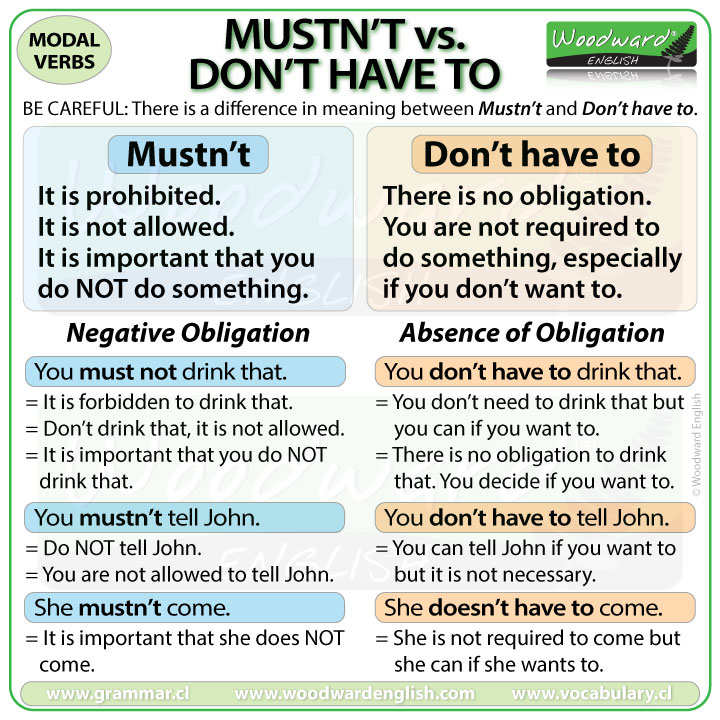



Mustn T Vs Don T Have To Woodward English
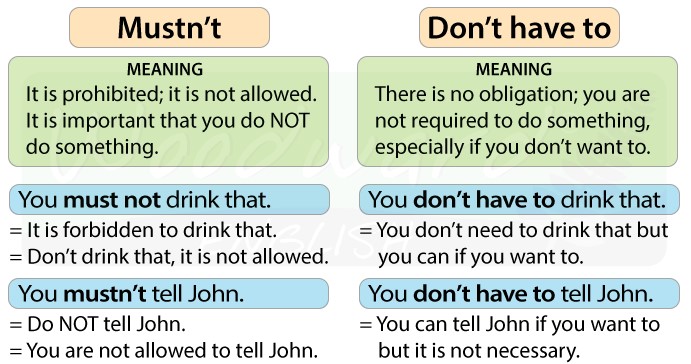



Modals Of Obligation And Prohibition Let S Learn English
:max_bytes(150000):strip_icc()/sign-warning-people-of-fines-for-feeding-wildlife-in-a-park-at-arakoon-in-new-south-wales--australia-847527992-5bc9d8c246e0fb0026d028e0.jpg)



How To Use Must Have To And Need To In English



Q Tbn And9gcsje02xoidnqkyh Cqn3dhnoot4mqu2ksbucf4wuoxuk Hxwsiw Usqp Cau




Must Vs Have To Build Up Your English Facebook




Modals I Wouldn T Won T Have Known Difference English Language Learners Stack Exchange




Difference Between Ought To And Need To With Table




Must Vs Have To




Must Vs Have To Build Up Your English Facebook




Test English Prepare For Your English Exam
/whats-the-difference-between-copay-and-coinsurance-1738506_final-4c635a490ace4b8d9ab16ac6fa61d192.jpg)



Differences Between Copay And Health Coinsurance




Commonly Confused Words 10 English Word Pairs That Confuse Absolutely Everyone Eslbuzz Learning English




Need Must And Have To For Learn English Today Com Facebook




The Difference Had Better Vs Have To Must Should English Modals




Must And To Have To In Question Posts Facebook
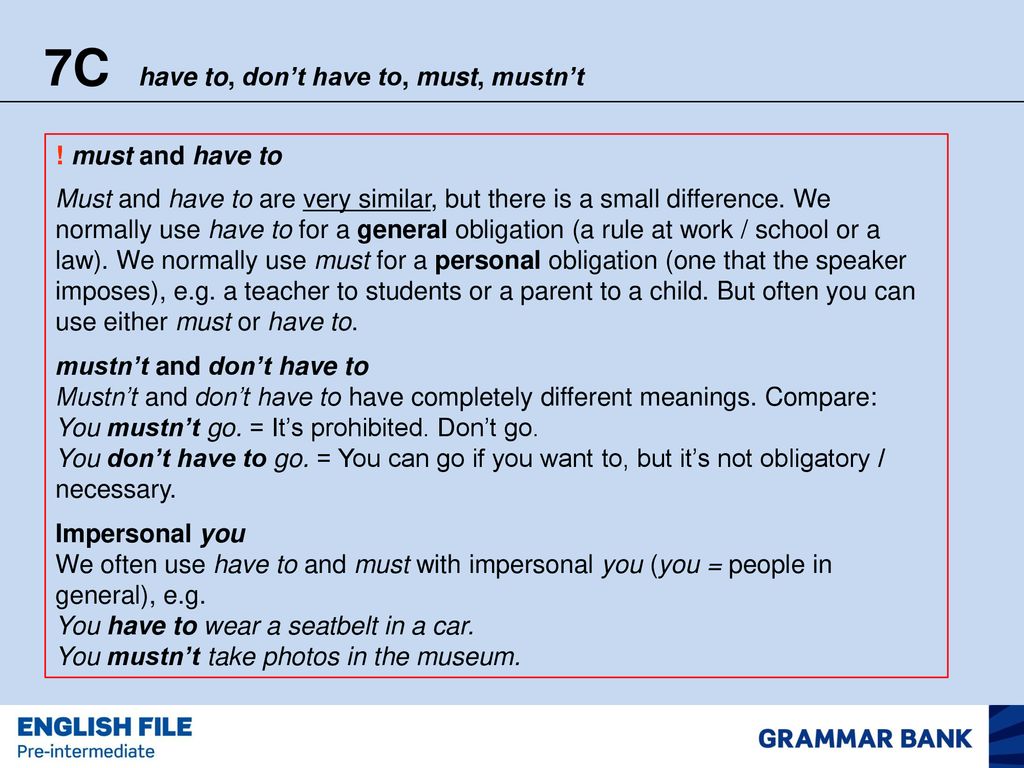



7c Have To Don T Have To Must Mustn T Ppt Download
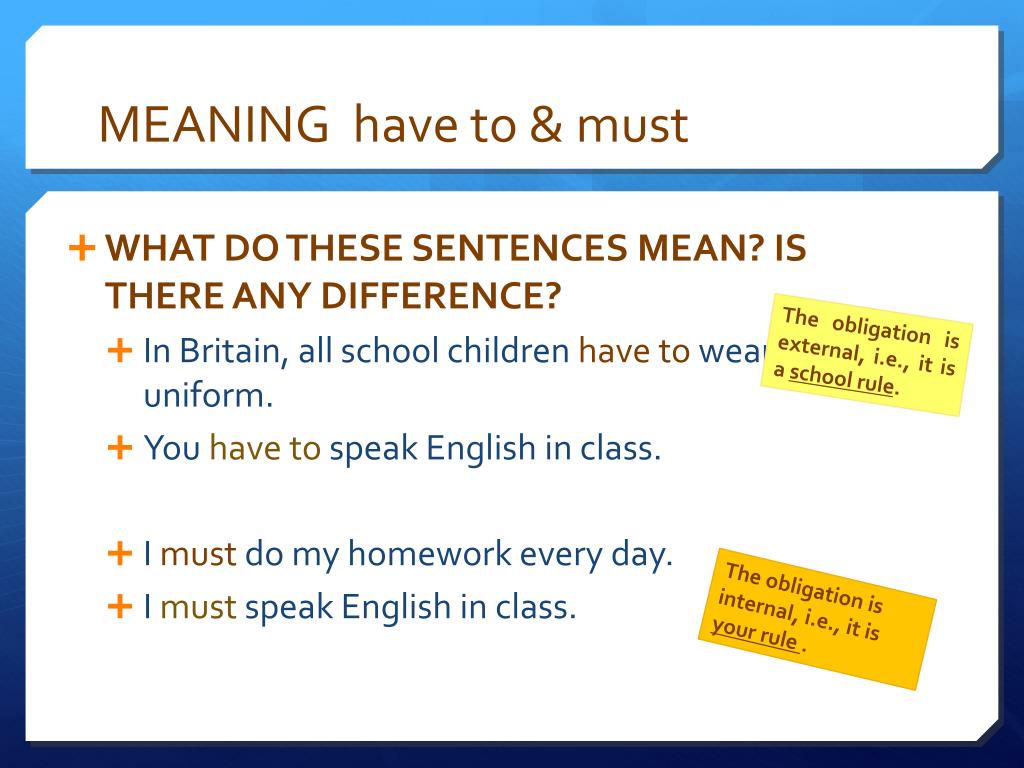



Ppt Modals Powerpoint Presentation Free Download Id




Must And Have To Difference A Free Guide Post
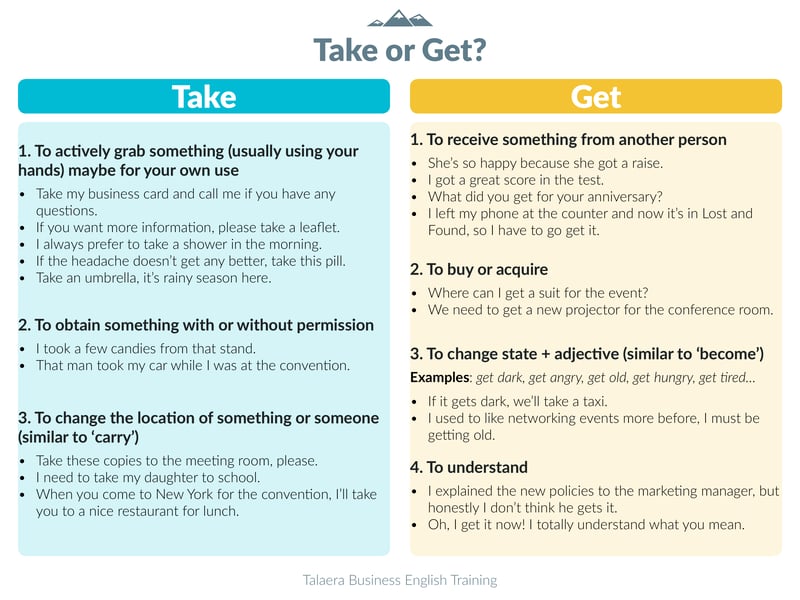



Take Vs Get Includes Examples And Exercises



Grammar Grade 9 Grammar Lesson 24 Must And Have To
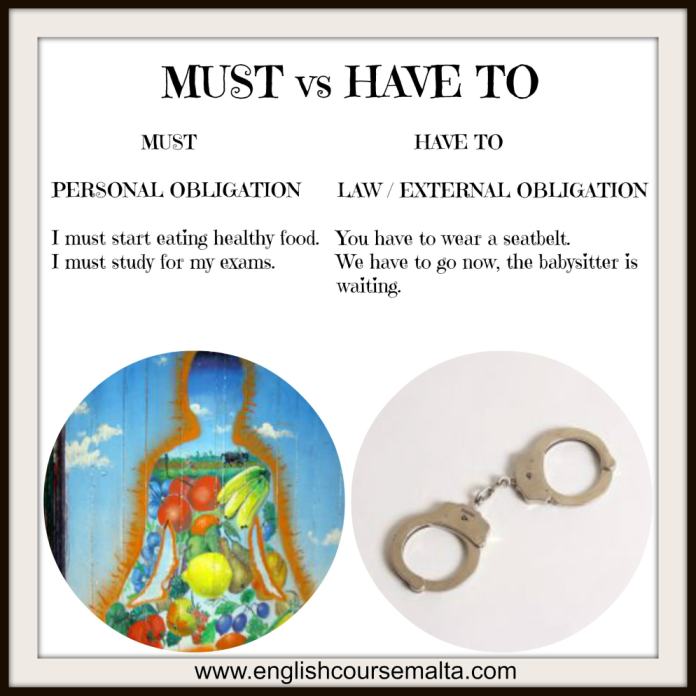



Must Vs Have To Infographic English Course Malta



Using Must And Have To In English English Study Here



1



Use Of Must May Can Could Have To Need To Has To Ea English




Must Vs Have To Modal Verbs Difference Between Must And Have To Grammar Lesson Spokenenglishcorner
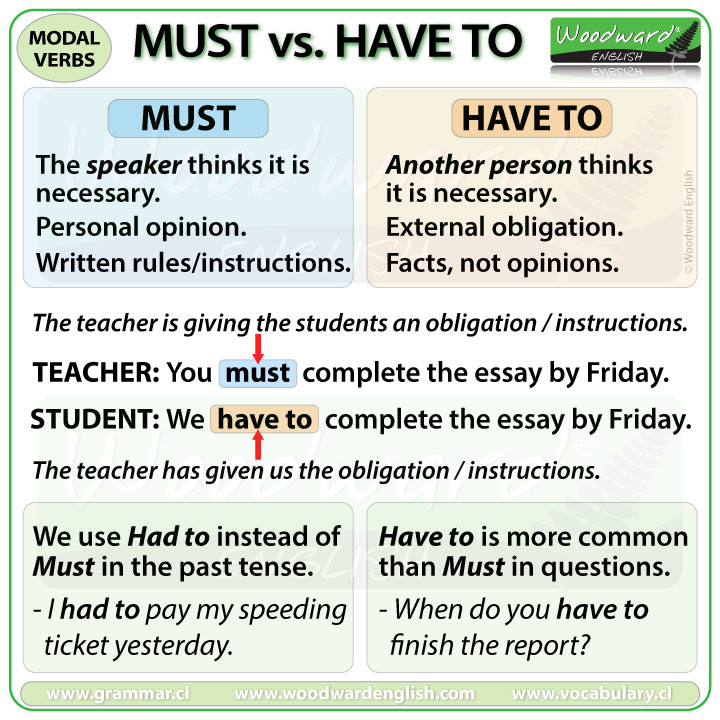



Must Vs Have To Woodward English




Tony Robbins Quote The Difference Between Must Should Is The Life You




The Difference Between Must And Have To Must Vs Have To Video




Must Vs Have To Must Not Vs Don T Have To 7esl English Writing Grammar And Vocabulary Learn English
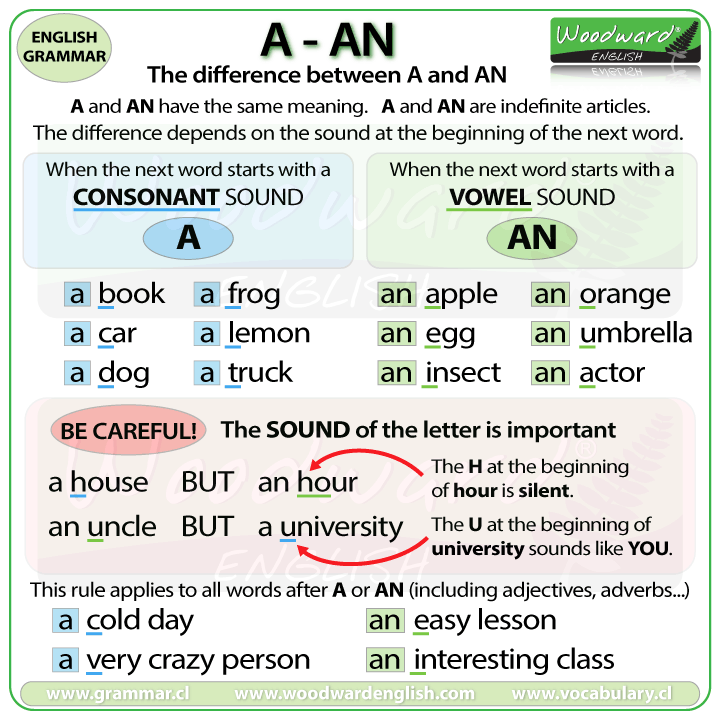



Articles Definite Indefinite And No Article English Grammar
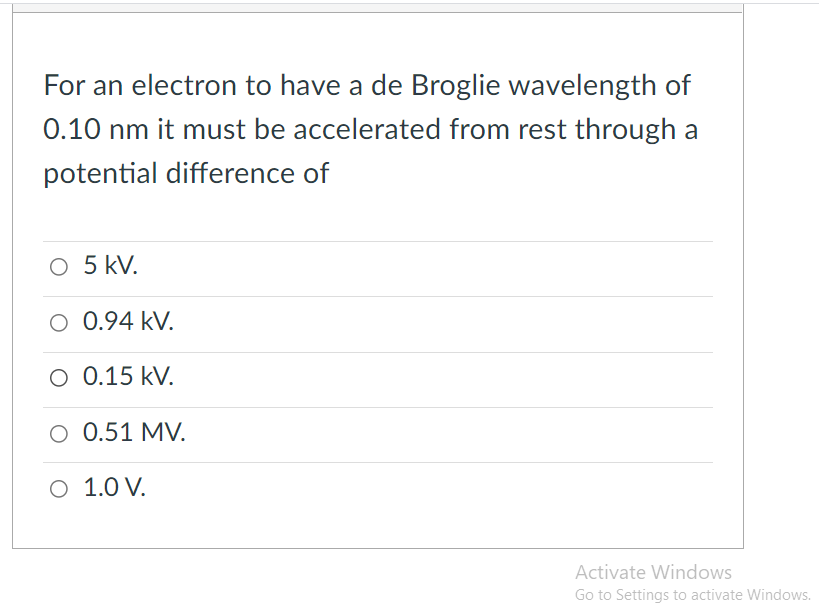



For An Electron To Have A De Broglie Wavelength Of Chegg Com




Must Vs Have To What Is The Difference Youtube
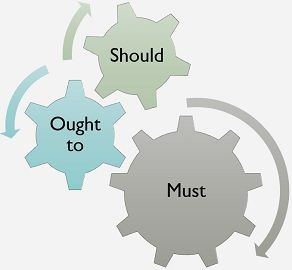



Difference Between Should Ought To And Must With Example And Comparison Chart Key Differences



Learn British English Grammar Free Video Must Have To Must Not Don T Have To Need Not Learn British English




Need Must And Have To For Learn English Today Com Facebook




Meaning Examples Can Could May Might Will Would Shall Should Must Shakespeare S English




I Had To I Have To Or I Must What Is The Difference Myenglishteacher Eu Blog




Must Vs Have To What Is The Difference Lagu Mp3 Mp3 Dragon




Must Vs Have To Youtube




Must Vs Have To What Is The Difference Youtube



Difference Between Must And Have To




Quick Tip Must V Have To




What Is The Difference Between Must Mustn T And Have To Don T Have To Must Mustn T Vs Have To Don T Have To Hinative



What S The Difference Must Not Vs Don T Have To Pela




Must Have To Worksheet Linguistic Typology Language Mechanics




Must Vs Have To Must Not Vs Don T Have To 7esl Teaching English Grammar Modal Verbs English Phrases




How To Use Must Have To And Should Modal Verbs Video Ooe
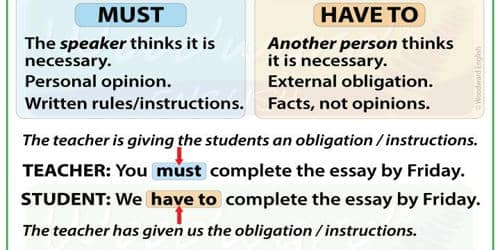



Difference Between Must And Have To Assignment Point




Mustn T Vs Don T Have To Woodward English




Grammar Je Parle English
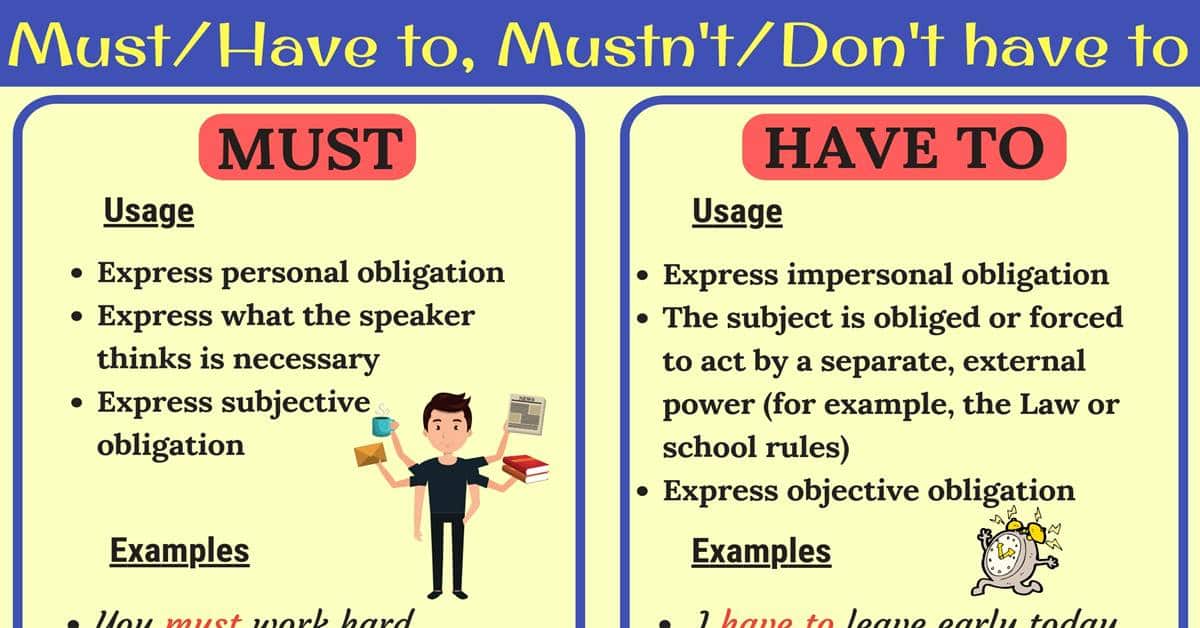



Must Vs Have To Must Not Vs Don T Have To 7esl




Difference Between Shall And Must With Table




The Difference Between Modal Verbs In Deontic And Epistemic Modality Semantic Scholar



1
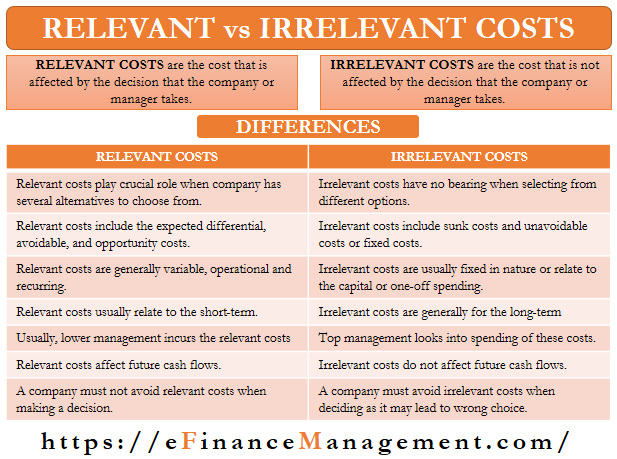



Relevant Cost Vs Irrelevant Cost All You Need To Know




Modals Nb Meaning Have To Must What Do These Sentences Mean Is There Any Difference In Britain All School Children Have To Wear A Uniform Ppt Download
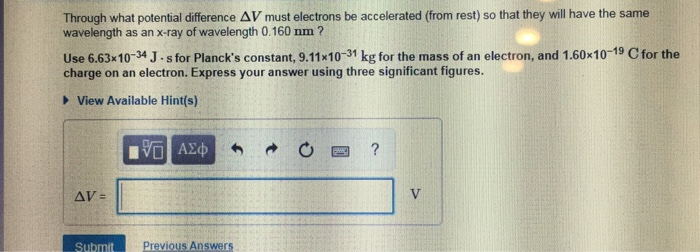



Through What Potential Difference Dv Must Electrons Chegg Com




The Difference Between Must Have To Shall Need And May




Product Priority How To Pick The Right Features For Success By Andressa Chiara Code Like A Girl




How To Use Must Have To And Should Modal Verbs Video Ooe



The Difference Between Must And Should Is The Life You Want And Picture Quotes




The Difference Between Must Have To Shall Need And May




Test English Prepare For Your English Exam




Have To Vs Must Watch This Video To Finally Learn The Difference




What S The Difference Between An Hsa And A Medicare Msa




Modal Verbs Part 3 Should Must Have To English Esl Worksheets For Distance Learning And Physical Classrooms
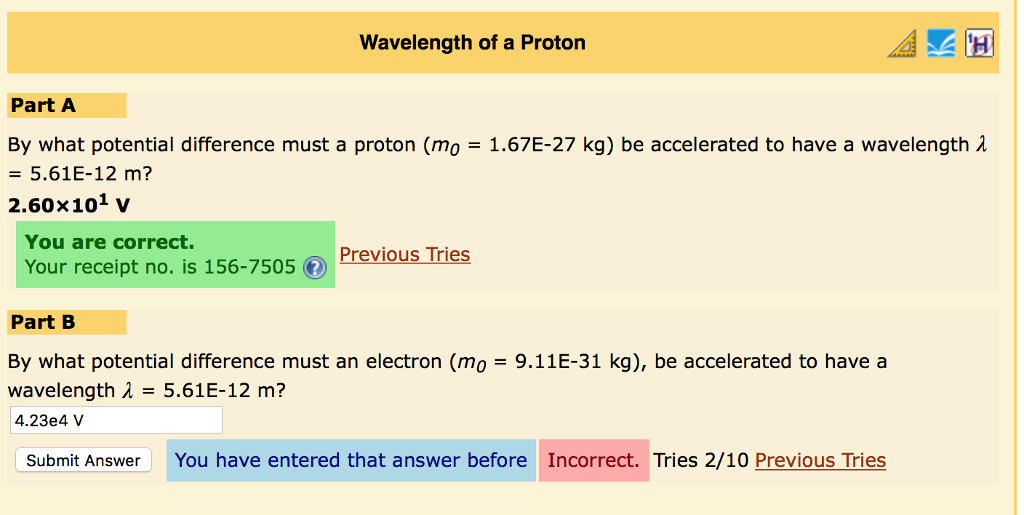



By What Potential Difference Must A Proton M 0 Chegg Com




The Difference Between Must Have To Shall Need And May



Difference Between Have To And Must Difference Between




Modals And Semimodals What Is The Difference Between




Unfolding Mysteries A Game To Practise Modals Of Deduction Teachinggamesefl Com By Mike Astbury




Modal Verbs I Must Have To Don T Have To Mustn T Ppt Video Online Download




Must Vs Have To




Gross Vs Net Differences Between Net Vs Gross You Must Know 7esl




Must Vs Have To Woodward English English Language Teaching Learn English Woodward English




The Difference Between Must Have To Shall Need And May



0 件のコメント:
コメントを投稿